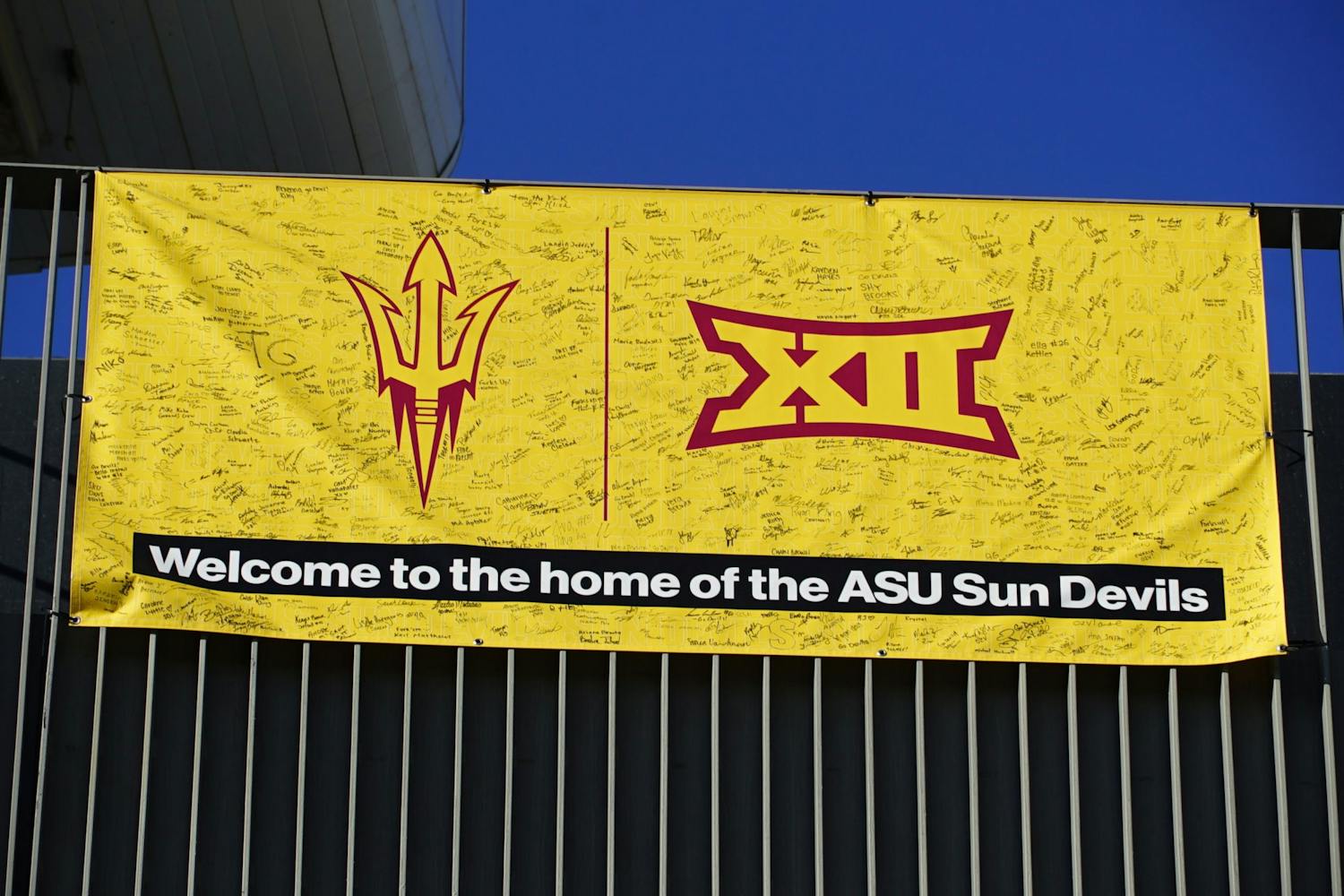New ASU softball coach Craig Nicholson knows he’s walked into a tremendous situation.
Only one starter departs from a 2013 Women’s College World Series team, while three returning players were first-team All-Americans at one point.
In 2011, ASU captured their second national championship, led by then-freshman pitcher Dallas Escobedo, who returns for her senior year with a wealth of big-game experience.
Nicholson takes over for Clint Myers, who in eight seasons, won two national championships and qualified for the Women’s College World Series seven times.
Nicholson previously coached at Ball State, where he revamped a program facing NCAA probation, and led the Cardinals to three regular season Mid-American Conference titles, including an NCAA tournament appearance.
Prior to his seven-year run at Ball State, Nicholson won four NJCAA national titles at Central Arizona. While Nicholson was coaching softball at Central Arizona, Myers was running the baseball program.
The State Press had a chance to sit down with Nicholson for an extensive question and answer session.
The State Press: Congratulations on getting the job. What was your reaction to getting that call?
Craig Nicholson: Thank you. Obviously I was excited. They offered me the job when I was here. Since I was at Central Arizona it’s a job I’ve held in high regard. I was just excited to have the opportunity to come here and coach this program.
SP: Would you consider this a dream job for you?
CN: Yeah, I think it is. This for me is a destination job and a place that I want to be at as long as we can continue to be successful.
SP: You’ve obviously got a good team in front of you. You inherited a good team from Clint Myers. What are your goals and expectations for ASU?
CN: You’re not going to set your goal any lower than winning a (Women’s College) World Series. I expect that we will be competitive in that area and have an opportunity to do that. As you get towards the end of the year, a lot of things have to fall right for you to get to that ultimate goal. We’re going to make sure we prepare and that we enjoy the process of getting to that point. The goal is out there. The process is many times more important than the destination. We got to make sure as a team we buy into the process so that when we get to that point we’re prepared.
SP: How exciting is it for you to start a challenge like this with a lot of talented players? There (are) certainly a lot different goals and things that you can achieve at ASU versus Ball State.
CN: Usually when you’re taking over any job, you’re taking over a program that’s not where it needs to be. This is a little bit of a unique situation taking over a program that’s been so successful for the last eight years. That brings challenges with it. All in all, I’d rather not go through the rebuilding phase. We’re in a spot where we don’t have to go through the rebuilding phase and we just have to continue to bring in great athletes, continue to go over and recruit well.
SP: How much of a different kind of job is this at ASU rather than when you took over Ball State, a program on probation?
CN: On probation. I think the record was 13 and 30-something. It’s very different. At Ball State the expectations grew as we went through the process. If I was still there this year we would have high expectations because that team is good. Here the expectations are here from day one.
SP: How much does it help your job out that you have a bunch of experienced players, a bunch of players who know what it takes to win, and some players who have actually won a national title?
CN: It helps a lot. As a staff we will depend on those players to play major roles, to lead, and in some instances help us through some things. I don’t think it’s going to be any major change or anything like that, but I do think it’s great having players that have been there before. Sometimes you’ve got to have been somewhere to know where you’re going and where the path is to get back there.
SP: Pretty much everyone is back from last year. You have three players who were first team All-Americans (Escobedo in 2011, senior outfielder Alix Johnson in 2012, junior catcher Amber Freeman in 2013), you also have senior shortstop Cheyenne Coyle who had 20 home runs last year, and Bailey Wigness who got the Elite 89 award for the highest GPA for any Women’s College World Series player.
CN: There’s no way to put that in words. You build programs to get to the point where this team is at this year. It’s one of those things where you’re not going to be at that point every year, no matter how good of a program you are. You’re never going to be at that point where we have everything that you just mentioned – three All-Americans returning, that’s pretty rare. Not just the three All-Americans returning, but everybody else around them that was with them. A ton of experience that’s going to be able to go onto the field every day. It’s a very interesting situation because it never happens where you walk into a team that’s as prepared as this team is to make a deep postseason run.
State Press: What’s been the reaction from the players you’ve talked to about having a new coach?
Craig Nicholson: It’s been positive. You take a team of 25 people and you’ve got 25 different personalities and some of them have been a lot more excited than others. Change sometimes brings about the fear of the unknown and that’s where some of them are at. We’ve just got to get to a point where we figure out what to expect from each other, figure out what to expect from them, not in terms of talent, but just in terms of their personality and what they’re going to be (like) every day at practice.
Probably more importantly, they’ve got to get to a point where they know what to expect from me. One thing that they’re going to find with me is I’m going to be pretty consistent with my approach on a day-to-day basis. Once we get through a week of practice, they’re going to have a pretty good idea this is who we’re dealing with, this is what this guy’s all about and it’ll just give them a chance to settle in and kind of build that relationship.
SP: You were at Central Arizona when Clint Myers was there. He was coaching baseball, you were coaching softball. Were you guys pretty close then?
CN: We talked a lot. I still think of Clint as a friend. We haven’t talked as much in the last seven years as when we were coaching there together, but yeah, every day we pretty much talked about something. Most of that was centered around either the game of baseball or the game of softball, but a lot of other things came up too. The one thing with Clint is he’s extremely intelligent. I always took advantage of picking his brains about what he thought about this or what he thought about that. I think it helped me in my career.
SP: Were you surprised that he left for Auburn?
CN: Yes.
SP: Why?
CN: I always thought of him as an ASU guy. He played here, he spent most of his life in Arizona, that kind of stuff. I was surprised. Quite honestly I’ve seen him out recruiting a little bit and we’ve talked about some things, but I never really asked him why. He’s got his reasons why he wanted to leave. It happens in this business. People make job changes for all different types of reasons, but if you’re asking if I was surprised when I first heard the news, absolutely.
SP: Clint always had a pretty big roster, 27 players on last year’s team. Do you plan on keeping a roster around that size? I know it’s sometimes set a couple years in advance with recruiting happening so soon.
CN: No. We will eventually get down to a number around 20. As you mentioned, it’s not going to happen overnight. I’m not going to run people off or cut people or anything like that, so it’s going to be a process of getting to a number that I’m more comfortable with. My comfort level in terms of a roster size is probably 18-22 (players).
SP: What is your coaching philosophy?
CN: I think in a nutshell I want to play the game fast. I want to be able to put pressure on people. I want to have players that can run, and can steal bases. I think being able to play quality defense is a huge part of this game, and that’s something I know ASU has done in the past, been very good defensively. I think in 2011 when they won the (Women’s College) World Series, they were probably the best defensive team in the country to go along with having very good pitching. Defense is often an overlooked part of the game and will spend a ton of time making sure we are very good on that side of the ball.
Offensively we want to run, we want to put pressure on people. As this staff gets to a point where we put our stamp on this program we will probably be more left-handed. We will have a few more slappers in the lineup. We may hit less home runs, but to me it’s about on-base percentage, it’s about being able to put pressure on people. It’s nice to have people that can change the game with one swing of the bat and I still think we’ll have that, but I believe that you beat great pitching by being able to manufacture runs. If you sit around waiting for someone to hit a ball out of the park, you may be sitting around past the time the game ends.
SP: When you took the job at ASU how much of the team had you seen on television, how much had you heard about the program?
CN: Limited. I watched a few innings of the (Women’s College) World Series this past year. I probably watched more in 2011 when they won it. I didn’t actually watch too much this year, we were actually on vacation. Obviously you can look at the numbers, which only tell part of the story, but some of the players, especially the ones from Arizona I saw play when they were young in high school or young in club ball. I have a foundation for sure. I don’t know if that compares to what you’re going to see out here at practice every day.
Note: When Myers was introduced as Auburn’s coach in a teleconference, he said he made the switch due to family reasons, with his coaches able to join his staff. Read that story here.
Reach the reporter at Justin.Janssen@asu.edu or follow him on Twitter @jjansssen11



